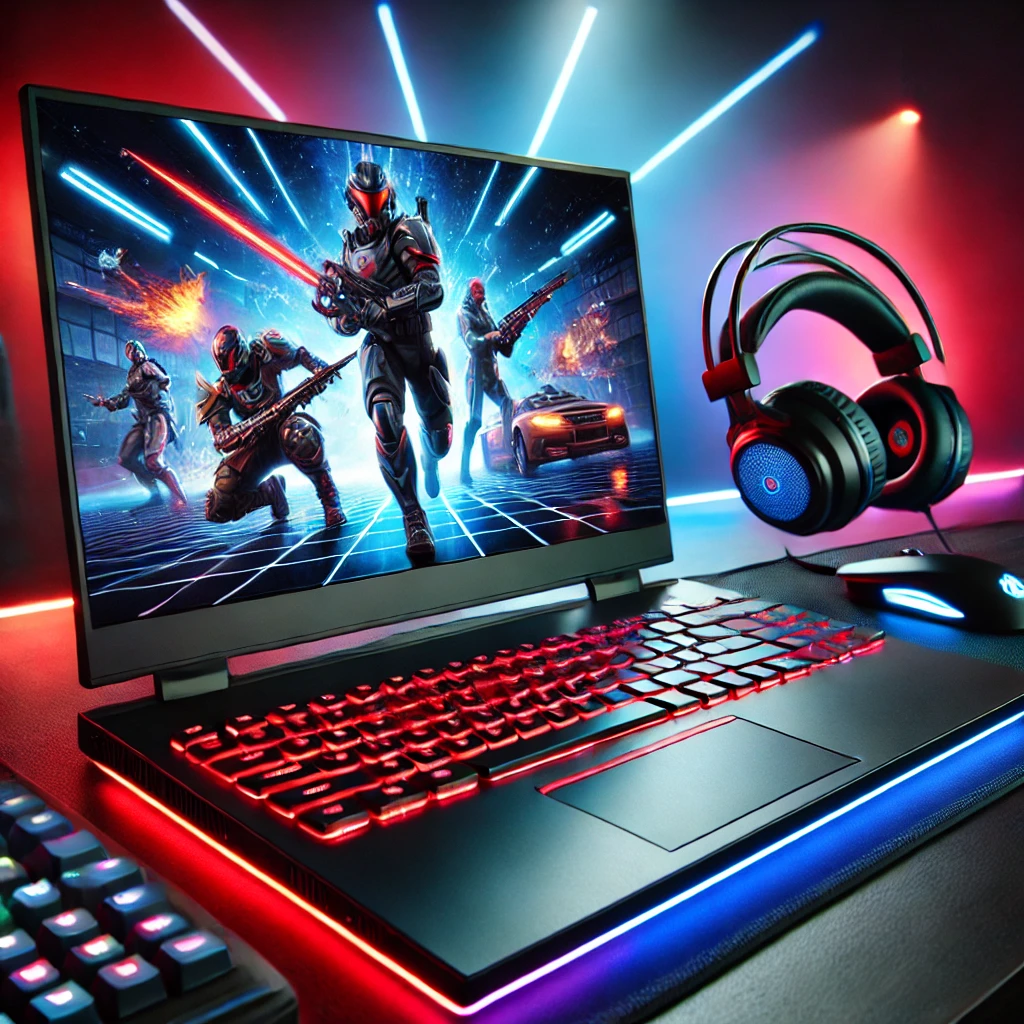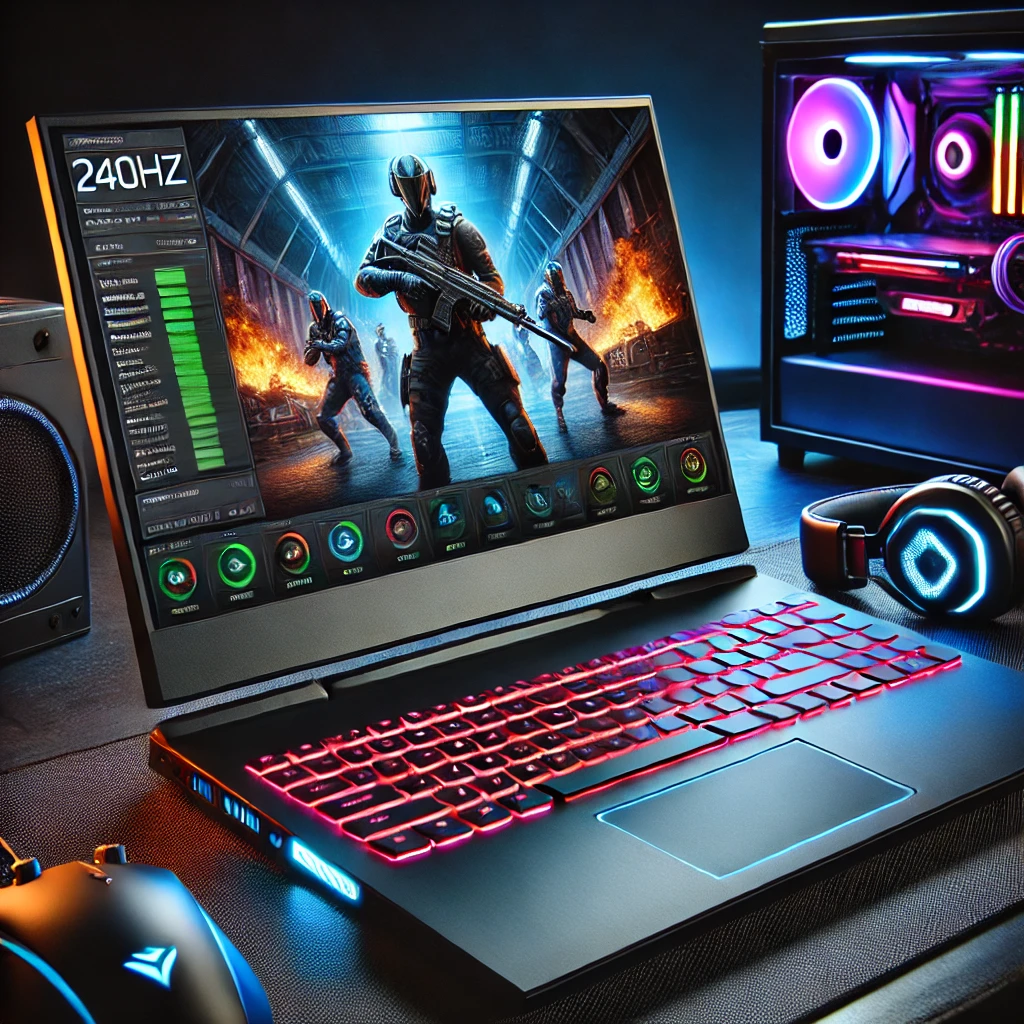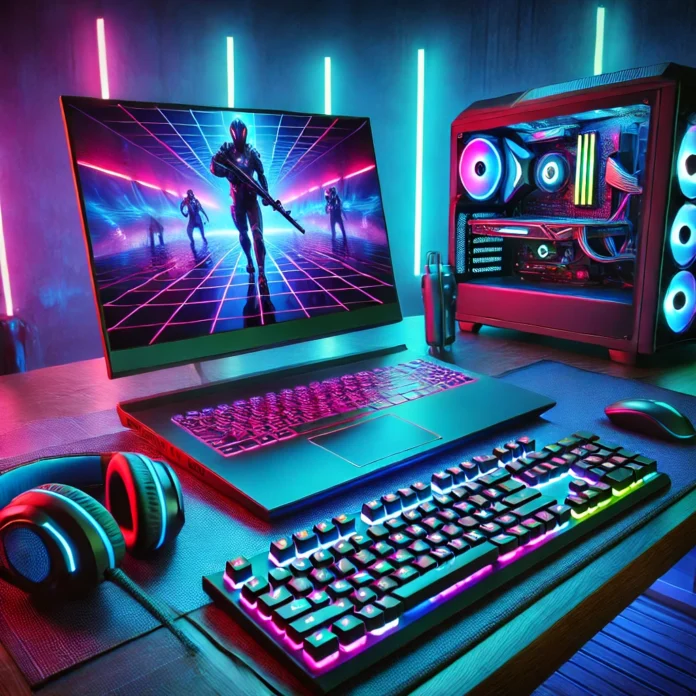Competitive eSports has become a global phenomenon, captivating millions of players and viewers worldwide. From high-stakes tournaments offering multimillion-dollar prize pools to grassroots gaming communities, eSports has evolved into a professional arena where every millisecond counts. Whether you’re dominating the ranks in CS:GO, outmaneuvering opponents in Valorant, or strategizing your way to victory in League of Legends, having the right gaming laptop is critical to staying ahead in competitive play. Best Gaming Laptops for Competitive eSports
Unlike casual gaming, competitive eSports demands top-tier performance. A gaming laptop with high refresh rates, powerful GPUs, and fast response times can mean the difference between a clutch win and a frustrating defeat. Portability also matters—whether you’re competing in a local LAN tournament or practicing on the go, a reliable gaming laptop keeps you in the game no matter where you are.
This guide will help you navigate the overwhelming number of choices available today. We’ll break down the best gaming laptops for eSports players, covering everything from budget-friendly options to high-end machines. By the end of this article, you’ll know exactly what to look for to elevate your competitive gaming experience. Let’s dive into the world of laptops built for eSports excellence!

What Makes a Laptop Ideal for eSports?
When it comes to competitive eSports, not all gaming laptops are created equal. Choosing the right laptop is essential to ensure smooth gameplay and gain that competitive edge. Here’s a breakdown of the key features and considerations for an ideal eSports gaming laptop.
a. Key Features for Competitive Gaming
1. High Refresh Rate Displays: For eSports titles like Valorant and CS:GO, a high refresh rate display (144Hz, 240Hz, or even higher) is non-negotiable. These displays ensure smooth visuals, reducing motion blur and providing quicker reaction times.
2. Powerful GPUs: A strong GPU like the NVIDIA RTX 40 series is crucial for delivering high frame rates, ensuring no lag during fast-paced matches.
3. Fast CPUs: Look for Intel Core i7/i9 or AMD Ryzen 7/9 processors to handle game engines, background applications, and streaming simultaneously.
4. Ample RAM: A minimum of 16GB of RAM is recommended, but 32GB is better for multitasking, such as gaming while running Discord or OBS.
5. Reliable Cooling Systems: Extended gaming sessions generate heat, so a robust cooling system is vital to prevent thermal throttling and maintain consistent performance.
b. Why Portability Matters in eSports
Portability is a major factor for competitive gamers. A lightweight laptop is easier to carry to LAN tournaments, training sessions, or eSports events. However, portability often comes at the cost of reduced performance or smaller screens. Striking a balance between portability and power is key, especially for gamers who travel frequently.
c. Build Quality and Durability
Competitive gaming demands durable laptops that can withstand daily use and travel. A sturdy chassis protects the laptop from wear and tear, while a responsive, durable keyboard is essential for intense gaming sessions. Features like anti-ghosting and customizable RGB lighting can also enhance the overall experience.
By focusing on these aspects, you can ensure your gaming laptop is ready to meet the demands of competitive eSports.
Top Gaming Laptops for Competitive eSports in 2024
a. Budget Options
If you’re entering the competitive gaming world without breaking the bank, there are excellent laptops under $1,500 that deliver solid performance for eSports titles. The ASUS TUF Gaming A15 stands out with its AMD Ryzen 7 processor, NVIDIA RTX 3050 GPU, and a 144Hz display—perfect for smooth gameplay in games like Valorant or CS:GO. Similarly, the Acer Predator Helios 300 offers an Intel Core i7, RTX 3060, and a sleek design with advanced cooling.
Pros: Affordable, reliable for popular eSports titles, and portable.
Cons: Limited future-proofing and lower refresh rates compared to higher-tier models.
Target Audience: Entry-level players and students starting their eSports journey.
b. Mid-Range Champions
For gamers willing to invest a bit more, laptops in the $1,500-$2,500 range strike the perfect balance between performance and price. The Lenovo Legion 5 Pro features an AMD Ryzen 7, RTX 4060, and a 16-inch QHD display with a 165Hz refresh rate, ideal for competitive gaming. Meanwhile, the Razer Blade 15 offers an elegant build, Intel Core i7, and an RTX 4070, delivering exceptional FPS for intensive titles like League of Legends and Apex Legends.
Pros: High refresh rates, powerful GPUs, and sleek designs.
Cons: Slightly heavier and less portable.
Target Audience: Serious gamers and semi-professionals.
c. High-End Powerhouses
For professionals and enthusiasts, premium laptops over $2,500 redefine eSports gaming. The Alienware x16 boasts cutting-edge performance with Intel i9, RTX 4090, and a 480Hz display for unmatched visuals and responsiveness. The ASUS ROG Zephyrus Duo 16 features a dual-screen setup, AMD Ryzen 9, and RTX 4090, offering unparalleled multitasking and immersion.
Pros: Extreme performance, premium features, and future-proof hardware.
Cons: High cost and reduced portability.
Target Audience: Pro gamers and streamers seeking top-tier performance.
These laptops cater to diverse needs, ensuring every gamer finds the perfect match for their competitive edge.

Key Considerations When Choosing a Gaming Laptop for eSports
a. Performance vs. Price
When investing in a gaming laptop for eSports, finding the right balance between performance and price is crucial. High-performance laptops with GPUs like the NVIDIA RTX 40 series and CPUs such as Intel Core i7 or AMD Ryzen 7 offer exceptional gaming experiences, but they often come with premium price tags. Assess value for money by prioritizing laptops that deliver consistent performance in eSports titles like Valorant and CS:GO without unnecessary features like 4K screens, which are less impactful for competitive gaming.
To avoid overpaying, focus on essential specs: a high-refresh-rate display (144Hz or higher), 16GB of RAM, and efficient cooling systems. Budget options like the ASUS TUF Gaming A15 offer excellent performance without breaking the bank.
b. Portability vs. Power
For competitive gamers on the move, portability is as important as raw power. Lightweight laptops like the Razer Blade series provide a good mix of portability and performance, making them ideal for tournaments. However, portability often comes with trade-offs, such as reduced cooling capacity or slightly lower specs.
Consider how often you’ll travel with your laptop and weigh that against your need for top-tier performance. A slightly heavier laptop like the Lenovo Legion 5 Pro may offer better cooling and long-term durability.
c. Upgradeability
Future-proofing is essential in gaming laptops. Look for models with upgradeable RAM and storage, allowing you to extend the lifespan of your investment. Features like expandable SSD slots or modular designs are a bonus, ensuring your laptop can keep up with evolving gaming demands.
d. Brand and Support
Trusted brands like ASUS ROG, Alienware, and MSI not only provide reliable performance but also excellent customer support and warranties. A strong warranty can save you from unexpected repairs, making brand reputation an important factor when choosing a gaming laptop.
By considering these factors, you can confidently choose a laptop that meets your gaming needs and budget.
Gaming Laptops vs. Desktops: Why Laptops Make Sense for eSports
When it comes to competitive eSports, the debate between gaming laptops and desktops is inevitable. While desktops are known for raw power and upgradeability, gaming laptops are gaining popularity for their unique advantages tailored to eSports players.
Advantages of Gaming Laptops for Competitive eSports
One of the biggest advantages of gaming laptops is their portability. Competitive players often travel to tournaments, LAN events, or practice sessions. A lightweight, high-performance gaming laptop with a 144Hz or 240Hz display ensures that you can compete anywhere without sacrificing quality.
Convenience is another key factor. With a gaming laptop, you don’t need to worry about setting up multiple peripherals or managing wires—everything is integrated. This plug-and-play functionality is perfect for eSports players who need quick and seamless setups for training or matches.
Gaming laptops also offer versatility, allowing users to transition easily between gaming and other activities like studying or working. For eSports enthusiasts balancing gaming and other responsibilities, this flexibility is invaluable.
Gaming Laptops vs. Desktops: A Comparison
While desktops generally offer better performance at a similar price point, they are stationary, making them impractical for eSports players who need mobility. Desktops are also bulkier and require additional equipment like monitors, keyboards, and external power supplies, which can be inconvenient for traveling players.
On the other hand, modern gaming laptops now rival desktops in terms of performance. High-end models with RTX GPUs, powerful CPUs, and advanced cooling systems can handle even the most demanding eSports titles.
In terms of cost, gaming laptops often include premium features like high-refresh-rate displays and portability, which adds to the price. However, for competitive eSports players, the convenience and mobility of gaming laptops outweigh these costs, making them the ideal choice.
This section highlights why gaming laptops are preferred for eSports while naturally incorporating relevant keywords.
Tips for Optimizing Your Gaming Laptop for eSports
a. Boosting Performance
To get the most out of your gaming laptop for eSports, optimizing its performance is crucial. Start by adjusting the graphics settings of your favorite eSports titles. Focus on lowering settings like shadows, post-processing, and anti-aliasing to prioritize higher frame rates. Games like Valorant, CS:GO, and League of Legends run smoother with these tweaks, giving you a competitive edge.
Keeping your drivers updated is equally important. Outdated GPU drivers can lead to performance issues and crashes during gameplay. Use tools like NVIDIA GeForce Experience or AMD Software to ensure your graphics drivers are up to date. Regular updates often include enhancements specifically for popular eSports games.
b. Maintaining Your Laptop
A well-maintained gaming laptop ensures longevity and consistent performance. Cooling is a major concern during intense gaming sessions. Invest in a quality cooling pad to improve airflow and prevent overheating. Additionally, make sure your laptop is placed on a hard, flat surface to ensure proper ventilation.
Routine cleaning is essential. Dust buildup in vents and fans can hinder cooling and reduce performance. Use compressed air to clean your laptop regularly. Software optimization is another key aspect—disable unnecessary startup programs and free up disk space to improve boot times and overall responsiveness.
c. Accessory Recommendations
Enhance your competitive gaming experience with the right peripherals. A responsive gaming mouse with customizable DPI settings and a mechanical keyboard with tactile switches can significantly improve your reaction time. Invest in a quality headset for clear communication and precise audio cues in team-based games like Fortnite or Dota 2.
With these optimizations, your gaming laptop can handle even the most demanding eSports environments, ensuring you stay competitive and enjoy the best possible performance.

Conclusion
Choosing the right gaming laptop for competitive eSports can be the key to achieving smooth, uninterrupted gameplay and maximizing your potential during tournaments. Critical aspects to consider include performance-driven hardware like high-refresh-rate displays, powerful GPUs, and fast CPUs that can handle fast-paced eSports titles with ease. Ample RAM, reliable cooling systems, and durable builds further ensure your laptop keeps up with demanding gaming sessions.
While high-end gaming laptops offer unparalleled performance, budget and mid-range options can still deliver excellent experiences for games like Valorant, CS:GO, and League of Legends. It’s crucial to weigh your priorities—such as portability for LAN tournaments versus raw power for high-end gameplay—and choose a laptop that best suits your eSports goals.
Remember, there’s no one-size-fits-all solution. The best gaming laptop for you depends on your personal preferences, gaming habits, and budget. By focusing on the features that matter most to your gameplay and future-proofing your investment, you’ll be equipped to compete at your best. Whether you’re an aspiring professional or a casual competitor, the right laptop can be a game-changer. Take the time to explore your options, and let your eSports journey reach new heights.
FAQs for Best Gaming Laptops for Competitive eSports
1. What features should I look for in a gaming laptop for eSports?
Look for a high-refresh-rate display (at least 144Hz), a powerful GPU (like NVIDIA RTX 30/40 series), a fast CPU (Intel Core i7 or AMD Ryzen 7 and above), at least 16GB of RAM, and a reliable cooling system. Portability and build quality are also important for traveling to tournaments.
2. Are budget gaming laptops good enough for eSports?
Yes, budget gaming laptops can handle most eSports titles like Valorant, CS:GO, and League of Legends at medium to high settings. Look for options with decent GPUs (e.g., GTX 1660 Ti or RTX 3050), sufficient RAM, and a responsive display.
3. Which brands are the best for eSports gaming laptops?
Trusted brands for eSports laptops include ASUS ROG, MSI, Alienware, Razer, Lenovo Legion, and Acer Predator. These brands are known for producing durable, high-performance laptops optimized for competitive gaming.
4. Can I use a gaming laptop for streaming eSports games?
Yes, many gaming laptops are powerful enough for streaming. Ensure your laptop has a strong CPU, GPU, and at least 16GB of RAM. For smoother streaming, consider laptops with dedicated software like NVIDIA Broadcast or OBS compatibility.
5. How do I maintain my gaming laptop for optimal performance?
Regularly clean the vents and fans to prevent overheating, update drivers frequently, and avoid running unnecessary background applications. Investing in a cooling pad and monitoring temperatures during gameplay also helps maintain performance.

